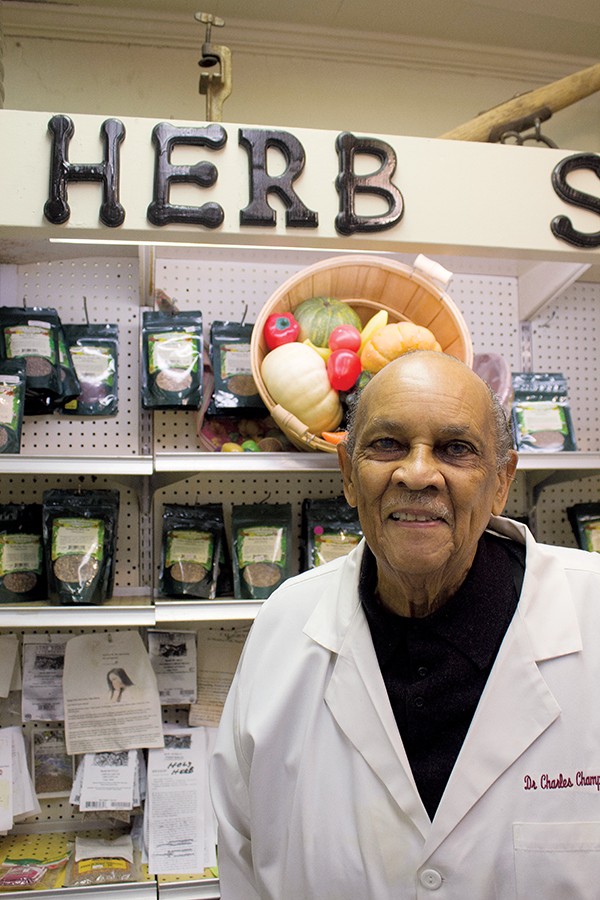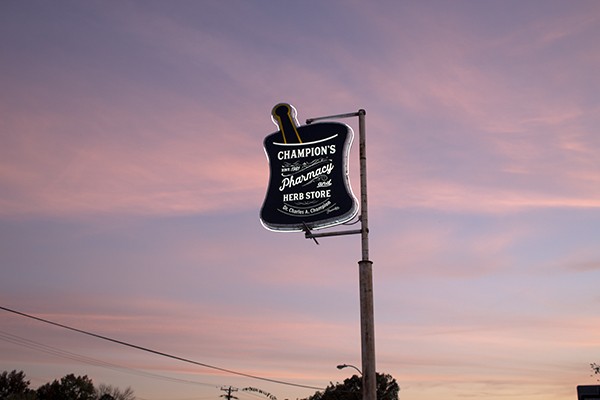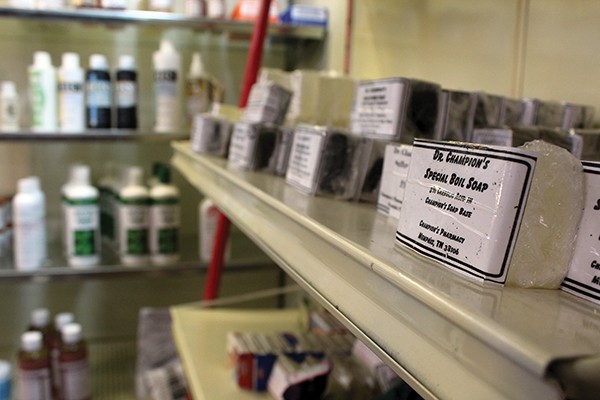Opaque lenses hide eyes that, for the last four years, have been able to make out only faint light. The man in the glasses, wearing a white coat embroidered with “Dr. Charles A. Champion,” sits in a green chair in Champion’s Pharmacy and Herb Store on Elvis Presley Boulevard. Champion is 88 years old, but still has his wits about him and shows up to work every day.
His wife of 60 years, Carolyn Champion, is sitting to his right. His cane, a stack of newspapers, and a plastic bucket of peppermints are on his left. Trusting his ears and gentle nudges from his wife, he gives one of each to everyone who walks by. Champion is the owner of the South Memphis pharmacy and has been there every day (Tuesday through Saturday) since 1991. But his pharmacy, which was originally located at Third and Mallory, has been open since 1981.
Champion hasn’t always sat in the front of his store greeting customers. That started when he began losing his eyesight in 2015.
 Photos by Maya Smith
Photos by Maya Smith
30 years
Gone Dark
“It started right after my daughter, who also worked here, died,” Champion says. “I remember it was May 2015, and I was supposed to go to Oxford to give a speech, but my eyesight started weakening and I had to cancel. Ever since then it’s been declining.”
Now, he says, he’s still able to get around familiar spaces like his house and his shop by relying on memory. With his wife by his side and cane in hand, he has to be guided everywhere else he goes.
Though he can no longer actively do the pharmaceutical work he’s done for over 60 years, Champion says the loss of his eyesight has been fairly easy to accept. “I see it as a plus.”
Before Champion lost his sight, he says he was always tied up making medicine in the back of the store and unable to spend time with customers. “Now I’m free,” he says. “I have papers and candy. I may not be able to do that over here, but I can spend my time doing this and make up for the situation.”
There are days when he misses working with medicine. “Of course, I miss being able to do what I’ve done for 60-plus years.”
Sometimes Champion says he pops into the back of the store to help his pharmacist daughters, Charita Champion-Brookins and Carol Champion. He often dictates special recipes stored in his head as they make various concoctions, like one for lye soap. “I tell them what to do, or they get me a chair and I mix it myself,” he says.
Sitting in the shadow of a brimming ceiling-high bookshelf, Champion says he spent his former years reading about medicine and taking in information. Now, it’s all filed away in his brain and Champion says he has to depend on his memory, pointing to his head.
Outside of his office, black tri fold posters with healthy eating tips are on display near the front windows. Across the room, several plaques boasting Champion’s accomplishments line the wall above a counter that reads “counseling and privacy.” Friendly chatter and laughter echo through the room.
If not for the shelves of herbal teas, creams, tinctures, capsules, and powders, you could almost forget you’re in a pharmacy. The place has the feel of a community center, where everyone addresses each other by name, and hugs are par for the course.
Champion says he strives to make people feel at home when they come to his store, striking up conversations with customers about their families or hometowns, whether that be Chicago or Holly Springs, Mississippi. “You just don’t come in here and spend your money without me knowing who you are and where you come from,” he says. “It’s not unusual that I get into three or four deep conversations a day.”
Henry Milow, a customer for 20 years, rests near an old-fashioned popcorn-maker in the lobby. He’s talking with another customer about the benefits of sulfur. Milow is from Detroit, but comes to Champion’s Pharmacy “every time I can make it happen.” He visits Memphis often for his job at a trucking company, and when he does, he stops by a familiar place.
“You can feel the warmth here,” he says. “You know you don’t get that at a lot of places you go now. You just give them money and that’s it. But not here. It’s different.”
When Milow first visited the store, on the advice of his sister, he says he was looking for something to help his allergies. “My sister told me to try some of Champion’s mixtures,” Milow says. “So I did and in a few days time I was good to go. Now, every time I come to Memphis I know one stop I have to make.”
Milow says he prefers Champion’s products because they are all natural. “You never know what kind of chemicals you get with some of those synthesized medicines you get from other places. No matter what, they got some natural stuff back there for you or something they can mix together real quick.”

In Stock
While Champion greets customers, his daughters do the heavy lifting, compounding and packaging medicine behind the counter. Unlike most other pharmacies, Champion’s doesn’t fill third-party prescriptions. Instead, they fuse modern medicine with herbal remedies, selling everything from house-made compounded drugs, like eczema ointments, to garlic oil capsules, pine tar shampoo, and foot fungus spray.
The store also keeps a full stock of “old, hard to find over-the-counter medicine that old people want,” Champion says. Like Father John’s cough medicine and Mutton Tallow used for moisturizing the skin.
“If anybody’s got it in Memphis, Champion’s got it,” Champion says. “You would have to be old enough to even know about some of these products. As a generation of people die out, it’s a shame that some of the products on the market will disappear, too.”
As a master herbal compounder, Champion also makes almost two dozen of his own remedy kits, called Dr. Champion’s Treatment Kits. There’s one for kidney stones, body odor, gout, and even swollen testicles. “The list goes on and on,” Champion says, but the most popular ailments that people seek homeopathic remedies for overall are migraines, anxiety, and libido issues.
Over the years, Champion says he’s also treated a number of customers who were hooked on narcotics. He gives them herbs to help with the withdrawal process and sometimes CBD oils to help with pain. Since the country’s ongoing opioid epidemic has been brought to the forefront, Champion says he’s been seeing more and more patients who are dealing with addiction issues.
Champion says you can go anywhere in Memphis and pick up herbs, but there’s an advantage to buying them from a pharmacist, noting proudly that his store is one of the only herb stores combined with a pharmacy in the state. “I have the knowledge, and I counsel patients,” Champion says. “I’ve been doing that since the state of Tennessee started requiring it in the ’80s.”
Even now that it’s mandated by law, Champion says most pharmacists only do the bare minimum, which is ask your name, birthdate, if you’ve taken the medicine before, and if you have any questions. But, Champion always asks a list of questions before giving customers anything. He points out myths about certain medications, discusses possible complications, and gives advice to help manage diseases better.
For example, he tells patients with diabetes that they should be on high fiber diets to help control their blood sugar levels. “A lot of people just don’t know,” Champion says. “And a lot of the time, the doctors and the other pharmacists might not take the time to tell you.”
Champion says he also has to be aware of what’s happening in the community around him. “When people come in, I ask them what ZIP code they live in to get a better idea of their lifestyle.”
In the South Memphis ZIP codes surrounding Champion’s store, he says food deserts are rampant, smoking is routine, and the life expectancy is around 60 years. Because of this, Champion says he often has to tell his customers the “hard stuff they don’t want to hear” or have never heard before.
“I turn down more people than I serve,” Champion says. “Just because you want a certain drug, it doesn’t mean you need it. I have to be the one to look out for people. I won’t give someone medicine just so they can continue living unhealthy.”
Champion’s Pharmacy hasn’t always focused on herbal medicine. Champion says when he first opened, the pharmacy regularly filled private prescriptions through insurance companies, but he found it hard to make money that way and to, ultimately, stay afloat. That, compounded with a break-in and theft problem, led the family to discontinue filling those prescriptions, “cold turkey,” transitioning solely to herbal medicine 12 years ago.
Champion says he “zeroed in on” what he learned during his time at Xavier University, where he studied pharmacognosy, the study of medicinal drugs obtained from plants or other natural sources. Additionally, he used what he learned over the course of his 12 years working at the pharmacy in John Gaston Hospital — now known as Regional One Health.

Margaret Brown.
The Journey
Born in Memphis and raised in the small Tennessee town of Greenfield, Champion says he didn’t always want to be a pharmacist. When he first went to college in the 1950s at Tennessee State University, he went with his mind set on becoming a medical doctor.
“I had no knowledge of pharmacy or pharmacy school,” he says. “I didn’t even know where one was.”
After seeing his grades as he struggled during his first year at TSU, he says he realized he “wasn’t fit for that,” so he looked for an alternative career path and landed at Xavier University Pharmacy School.
“I enjoyed pharmacy school because it was something new,” Champion says. “I didn’t know anything about pharmacognosy, analytical chemistry, or biochemistry.”
Graduating pharmacy school in 1955, Champion says the draft was hanging over his head, as he searched for a job in his field. Failing to find one, Champion was drafted to be a United States Army pharmacist in Germany.
“I never thought much about it,” Champion says of his time in the Army. “After World War II, it was a basic obligation. I just went and did my time. It wasn’t so bad.”
Overseas, working at almost a dozen different camps and at a hospital making medicine for soldiers, Champion says he tried to get as much experience as possible, knowing he would have to find a job when he got home.
After his two-year tour of duty, he returned to the States and began to work in the John Gaston Hospital pharmacy, where he was the first professional African-American pharmacist to work in a Memphis hospital. Unlike Champion’s time in Germany, where he says he was “accepted by the people,” who trusted him to take care of them, back in Memphis at John Gaston racial tensions were alive.
Champion is married to the daughter of Walter and Lorrie Bailey, owners of the Lorraine Motel at the time Dr. Martin Luther King Jr. was assassinated there. At the time, Champion was still working at John Gaston, which had no black doctors and where he received little support. Though never directly harassed, he says he started to feel uncomfortable. “It was hard for them to see a black man as a professional back then.”
It was a constant challenge being a black pharmacist in Memphis during the segregated 1960s, Champion says, recalling the meals he had to eat in a separate hospital, away from the white doctors. Champion says the doctors didn’t want to listen to him, even though “I, as an African American, can perform just like anyone else.”
“We’d be here until 10 the next morning if I rehashed everything [from the 1960s],” Champion says, with a chuckle. “I could go on and on talking about that.”
Growing up in Greenfield during the 1940s, Champion says he was used to being alienated because of his race. He says he just stayed in his place.
“For example, even as a pharmacist, I had sense enough not to walk in a drug store and ask for a drink from the soda fountain,” Champion says. “I just stayed in my place, and it’s paid off. It’s not that I condoned it, I just worked through it.”

Champion’s Pharmacy and Herb Store stocks a variety of herbal remedies, such as the Special Boil Soap.
Something Greater
After working 12 years at John Gaston, Champion began working at Katz drug store as the first African-American pharmacist to be hired by a chain store in the city.
All the while, he was soaking up knowledge. A decade and two years later, Champion took out a loan and opened Champion’s Pharmacy, the store he sits in today. Champion says he’d always wanted to venture out and “do his own thing.”
“I’ve always wanted to be in private practice,” Champion says. “Since I was in pharmacy school, I had been clipping information and saving it in a notebook. I’ve always been taking notes. I didn’t want to be in a position where people were always telling me what to do, so I had to become the boss.”
With the experience from each chapter of his journey — the army, John Gaston, and even his restaurant job at age 15, where he says he learned how to serve people, in a “little old country town flipping hamburgers,” Champion says he was ready.
“On the first day I opened, I filled more than 100 prescriptions,” he says. “And every day after that we’ve been going steady.”
It’s been a full circle since the beginning of his career, Champion says, recalling how he’s served customers whose mothers he once gave iron pills to while they were in the maternity ward at John Gaston. “I was taking care of them before they were even born,” Champion says. “Just about every day, I have people come in and say ‘Hey, Dr. Champion, you remember me?’ or ‘I know you from so-and-so.’ I have a big following.”
Champion’s averages about 15,000 customers a year, most from Memphis.
Carolyn Champion, her husband’s partner for more than 50 years, sits in the lobby answering the store phone, which is ringing off the hook. She says over the years she’s enjoyed watching the business grow, “starting from nothing to where we are now.”
“We’ve made enough to financially support our family,” she says. “It’s also just been a way of life for us. My children are here with us, and it’s home.”
Champion’s daughters will continue the business when he finally has to hang up the white coat, but until then, Champion has no intention of retiring.
“Why retire when you’re loving what you do?” Champion says. “When you retire, you die. You go home and you just sit.” Champion says he keeps his mind and body fresh so that he can continue to work and set a good example for his customers.
“I have to keep my body in motion,” Champion says, detailing his morning treadmill routine. “I cannot tell people to exercise if I’m not doing it myself. I have to keep my body in motion.”
Champion says because his customers are loyal, they keep him motivated to stick around. As if on cue, a customer calls out, “Hey, Champ, looking good!” as Champion feels his way back to his chair in the front of the store.